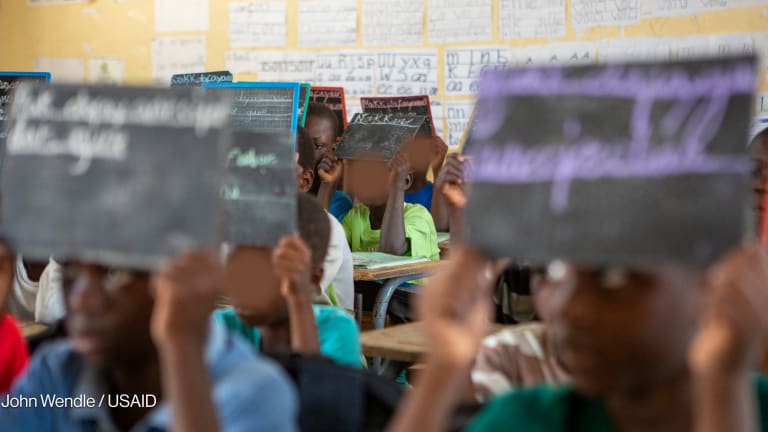
LONDON — The World Bank’s head of education has said its new teacher observation tool is not intended to be used to find and fire bad teachers or to undermine teacher professionalism, after concerns were raised by some experts.
“This is not an evaluation tool,” Jaime Saavedra, who heads up the bank’s global education practice and was previously minister of education in Peru, told Devex. “Policymakers need to know what’s happening inside the classroom and the quality of the interaction between the teachers and students … [and] this tool is designed to see better what’s happening there,” he added.
The bank officially launched Teach, an open-source classroom observation tool for use in primary schools in low- and middle-income countries to help improve the quality of teaching, last month. The tool is part of a broader effort to address what the bank has called a global “learning crisis” by focusing on teachers, which it says are the single most important factor in improving learning outcomes.
More on education:
► Global data dashboard aims to tackle education crisis
► Jaime Saavedra: 'There's nothing soft about education reform'
It is intended to help governments track whether teacher-specific education reforms are working and diagnose problems in education systems. It can also be used as a professional development tool by highlighting a teacher’s strengths and weaknesses, according to the bank’s briefing document. A coaching tool to help individual teachers improve is also being developed.
The observation tool has been welcomed by many in the global education sector, but has also attracted criticism, including suggestions that it undermines teacher professionalism by hiring nonteachers with just four days training to do the observation. Citizen observers score teachers for a range of practices including time spent teaching; how “on-task” their students are; and whether their teaching creates a supportive learning culture and encourages students to think critically.
“If the Bank agrees that teachers are professionals, then they must respect certain standards for professional evaluation,” head of Education International, David Edwards, wrote in a blog.
Some have also suggested Teach could be used to evaluate teachers and fire those who perform badly, something teachers’ unions are likely to oppose and which the bank has denied — Saavedra said that Teach “is not useful for that.”
However, other experts speaking at the official Teach launch event in Washington, D.C., last month disagreed. Eric Hanushek, senior fellow at Stanford University, said “this is a clear evaluation tool at the probationary stage … It provides a basis for counseling new teachers on how they should behave … but then again if they don’t change over the first few years you also have information you should use.”
Barbara Bruns from the Center for Global Development, said that even if not intended as an evaluation tool, there is a danger it could be seen by teachers as such and rejected.
For Saavedra, however, improving meritocracy in teaching is a political issue. “The key point on education reform for many middle- and low-income countries … is to take politics out of the classroom and the education system. We see too many cases where teachers and principals … are appointed on a political basis,” he told Devex.
The education boss also denied the accusation made by Education International’s Edwards that Teach was “developed without adequate involvement of the teaching profession,” explaining that the tool was piloted in more than 1,000 classrooms and developed with feedback from teachers and teaching authorities. “It would have been impossible to do without teachers,” he said.
He also said the tool does not undermine teachers and that members of any profession, especially something as complex and skilled as teaching, need to get feedback in order to improve.
Teach is the latest education endeavor announced by the bank as part of its human capital push, which kicked off with the Human Capital index launched last October. In January, the bank announced a data dashboard to measure the effectiveness of education policies and practices. It will also be part of a soon-to-be-announced education technology hub, with the United Kingdom Department for International Development, looking at effective innovations in low-income settings.
While uncertainty surrounds the bank’s leadership, amid a sudden change of its presidency, Saavedra said he is not worried that education — not traditionally seen as a priority at the bank — will lose momentum under new leadership.
“What keeps me awake at night is the magnitude of the learning crisis. Countries are extremely far from where they need to be … and we need to continue to support countries with system-wide reforms,” he said.








